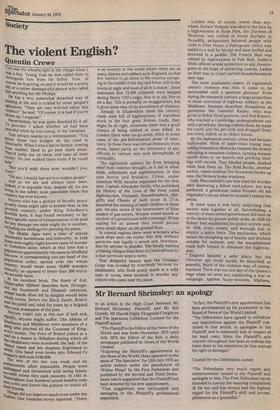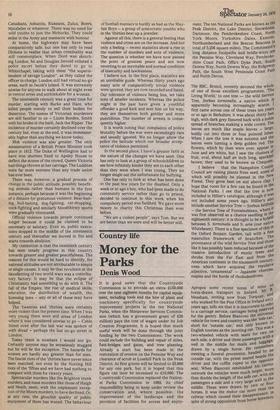Mr Bernard Shrimsley: an apology
In an action in the High Court between Mr Bernard Shrimsley, Plaintiff, and Mr Bill Grundy, Mr Harold Digby Fitzgerald Creighton and The Spectator Unlimited, Counsel for the Plaintiff stated:
"The Plaintiff is the Editor of the News of the World and was from November 1972 until July 1975 the Editor of the Sun, a daily newspaper published by News of the World Limited.
"Following the Plaintiff's appointment to the News of the World, there appeared in the issue of 'The Spectator' for 12th July 1975 an article written under the pseudonym ofJ 'Walter Plinge' by the First Defendant and published by the Second and Third Defendants which suggested that the Plaintiff had been demoted by his new appointment. "That suggestion was unfounded and damaging to the Plaintiff's professional reputation.
"In fact, the Plaintiff's new appointment has been accompanied by his promotion to the Board of News of the World Limited.
"The Defendants have agreed to withdraw any imputations against the Plaintiff contained in that article, to apologise to the Plaintiff, and to indemnify him in respect of his legal costs. Since the Plaintiff's sole concern throughout has been to redress the harm done to his reputation, he has waived his right to damages."
Counsel for the Defendants stated:
"The Defendants very much regret any embarrassment caused to the Plaintiff and apologise to him. The First Defendant never intended to convey the meaning complained of. He has and has always had the highest regard for the Plaintiff's skill and accomplishments as a journalist."
Canadians, Ashantis, Russians, Zulus, Boers, 1Vlatabeles or whatever. There was no need for wild youths to join the Mohocks. They could enlist in the Army and massacre with honour.
At home, the highways may have been comparatively safe, but one has only to read Dickens to realise that urban criminality was still commonplace. When Dore was sketching London, he and Douglas Jerrold enlisted a police escort before they dared to go to Whitechapel, taking with them "the superintendent of savage London", as they called the officer in charge. London still had virtual no-go areas, such as Jacob's Island. It was extremely unwise for anyone to walk about at night even in central areas and unthinkable for a woman.
The nineteenth century was a great time for murder, starting with Burke and Hare, who killed people merely to sell their bodies for dissection. The names of Victorian murderers are still familiar to us — Lizzie Borden, Smith with his brides in the bath, Jack the Ripper. The incidence of murder certainly declined over the century but, even at the end, it was immeasurably higher than anything we know today.
Mob violence was also greater. The only assassination of a British Prime Minister took place in 1812. The Duke of Wellington had to have iron shutters fixed to Apsley House to deflect the stones of the crowd, Queen Victoria had things thrown at her carriage. The Luddites were far more extreme than any trade union has ever been.
There was, however, a gradual process of change in the public attitude, possibly benefiting animals rather than humans in the first instance, perhaps because it was the beginning of a distaste for gratuitous violence. Bear-bait• ing, bull-baiting, dog-fighting, cat-dropping, cock-fighting and similarly bloodthirsty sports were gradually eliminated.
Official violence towards people continued longer because it could be claimed to be necessary or salutary. Even so, public executions stopped in the middle of the nineteenth century and thereafter we moved in fits and starts towards abolition.
My contention is that the twentieth century has seen steady progress in this country towards greater and greater peacefulness. The reasons for this would be hard to identify, for national attitudes are not attributable to simple or single causes. It may be that revulsion at the bloodletting of two world wars was a contributory factory. It may be that the eclipse of Christianity had something to do with it. The fall of the Empire, the rise of medical skills, education, the distribution of wealth, the licensing laws — any or all of these may have helped.
The 'twenties and 'thirties were certainly more violent than the present time. When I was very young there were still areas of London where it was considered unwise to go — Cable Street even after the last war was spoken of with dread — perhaps the last no-go street in London.
Today there is nowhere I would not go. Certainly anyone may be senselessly mugged but he will be the exception. The hazards for women are hardly any greater than for men. The fascist riots of the 'thirties have never since been matched, not even by the Notting Hill riots of the 'fifties and we have had nothing to compare with them for twenty years.
Spectacular murders like the Brighton trunk murders, and mass murders like those of Haigh and Heath, seem, with the unpleasant exception of the Moors murders, to have declined. Or, at any rate, the ghoulish quality of public enjoyment of them has waned. The behaviour of football maniacs is hardly as bad as the Mayfair Boys — a group of aristocratic youths who in the 'thirties beat up a jeweller.
Against all this, there is a general feeling that violence and crime are on the increase. And not only a feeling — recent statistics show a rise in the number of murders and acts of violence. The question is whether we have now passed the point of greatest peace and are now reverting to an inevitable and normal condition of insecurity and lawlessness.
I believe not. In the first place, statistics are an unreliable guide. Whereas thirty years ago many acts of comparatively trivial violence were ignored, they are now recorded and listed. Our tolerance of violence being less, we take note of smaller incidents. Whereas the police might in the past have given a youthful offender a good kick and sent him on his way, " they are themselves both gentler and more punctilious. The number of arrests is consequently higher.
It is worth noting that complaints of. police brutality before the war were exceedingly rare and usually ignored. We no longer allow the police the latitude which our broader acceptance of violence permitted.
In the second place, I have' a greater faith in the nature of the changes we have seen. One has only to look at a group of schoolchildren to see how infinitely kinder they are to each other than they were when I was young, They no longer single out the unfortunate for bullying.
One has only to look at what has been done -in the past few years for the disabled. Only a week or so ago a boy, who had been made to do community service rather than go to prison, decided to continue in this work when his compulsory period was finiShed. We gave more money to charity this Christmas than ever before.
"We are a violent people", says Tom. But we are better than we were and will be better still.



































 Previous page
Previous page